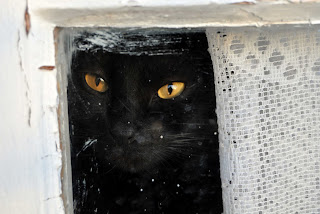 |
| Mandela and Clarke. Benny Gool Photo. |
LATE Saturday night
(6 February) my Blackberry vibrated with urgency on my night table. Oh no, not
another Zuma moment, I thought, in deference to the fact that the embattled
Presidency – in the belief that bad news and political skulduggery can be diluted
– now issues its press releases after deadline.
Fortunately, Number
One hadn’t decided to play musical ministers, devalue the rand again or throw
another Cabinet crony under the bus. It was a WhatsApp message telling me that
Mandla Mandela had become Muslim. What?! I did a double take. Mandla Mandela a
Muslim!
I opened the
message and saw grainy cell phone images of Madiba’s elegant grandson in a Cape
Town mosque. He was with the Muslim Judicial Council’s Shaikh Ebrahim Gabriels,
who’d apparently just married him to a stunning young lady called Rabia Clarke.
According to reports, Mandla had embraced Islam in November last year at the hands
of Shaikh Riyad Walls, imam of the Stegmann Road mosque in Claremont.
Indeed, it was a
pleasant change from Nkandlagate or the Days of Our Guptas, but I did wonder at
the time how Mandela’s leap of faith would be interpreted and understood, not
only in the Muslim community, but by all South Africans.
Another public
figure, Justice John (now Yayha) Hlope had embraced Islam in April last year
and married another judge, Gayaat Salie Samuels. Since then, the Hlopes had enjoyed
a relatively low – and dignified – domestic profile after an initial blaze of
publicity.
However, if you’re
a Mandela – a Tembu chief and the grandson and nominal heir of the mighty Madiba
– your DNA guarantees you media curiosity, paparazzi interest and gossip,
especially if you’ve had “women” and other “troubles”.
These “troubles” have
ranged from being accused of selling the media rights of Madiba’s funeral to
reburying, without family permission, the remains of his three children. This
caused a family rift, resulting in a court order for their bodies to be taken from
Mvezo back to Qunu. It was believed that Mandla had moved
the bodies in an attempt to cash in when his grandfather passed on.
If that was not
enough, Mandla Mandela had had to face two charges of alleged road rage involving
Amanda Liwani in 2012 and Mthatha schoolmaster, Mlamli Ngudle, in 2013. It is perhaps
significant that these events coincided with a cuckolding and the consuming fury
of an aggrieved, estranged first wife, whom he’d married in a civic ceremony in
2004.
A second, customary
wedding to a 19 year-old from Reunion, Anais Grimaud (Nkosikazi Nobubele) in
2010, saw the increasing wrath of Tando Mabunu, his first wife, whose ire must
have peaked when he took a third spouse, the Swazi princess Nodiyala Makathini,
in 2011.
Inflamed by the
fact he’d entered into customary marriages – and seeing a legal conflict
between customary and civil matrimony in community of property – she sued for
bigamy and won her case, attaching his cattle and suing for half his income on
other charges of an alleged failure to pay maintenance.
To add to his woes,
Mandla was to discover that his son, Qheya – named by Madiba himself – was not
his, but the outcome of adultery by his own brother with Grimaud, who was sent packing
to her mid Atlantic home.
Islam is not a
confessional creed; to become Muslim is to earn absolution from the past. But Mandla
Mandela, a very public figure, had to enter the faith with his personal baggage
in full view. However, what he ultimately did belongs to his soul; it is
between him and his Creator. And on that no one – absolutely no one – has the
right to judge him.
But Mandla Mandela –
whom I’ve heard is happily reconciled to his identity anyway – has since been
the victim of some unbecoming phobia and blatant racism, which is unfortunate
given the tinder-box status of racism in the country right now.
I first got to hear
about this at the State of the Nation Address (from where I was broadcasting
with Voice of the Cape) when our reporters came back saying that members of the
crowd had booed Mandla on the red carpet. He was with Makathini, and so I wasn’t sure
whether he’d been catcalled for not having his recent wife with him, or because
he’d become a Muslim.
Earlier, the
Congress of Traditional Leaders of South Africa (CONTRALESA) had indicated that
a Muslim could not be a clan chief. Xolile Ndevu had told the media there was a
“problem” with his “Islam”. I’ve heard that CONTRALESA – who were acting unconstitutionally
– did later
recant, but the damage had been done: the suggestion that a Muslim man could
never be an acceptable leader in traditional circles.
With Mandla this
was a touch ironic, I thought. The late Hasan Ghila, who’d embraced Islam in Cape
Town in the 1950s, had told me that he’d heard the adhan, the call to prayer,
whilst a child in the hills of the Transkei. It was an amazing spiritual
experience, he’d said, and he’d depicted it as the call of his ancestors.
I’m certainly not
ascribing group superiority in any way; the point is that the primordial nature,
even some ancient customs of the isiXhosa, are essentially Abrahamic. The fact
that it is African is what – inexplicably – leads to a feeling of shame when
the opposite should be true.


















